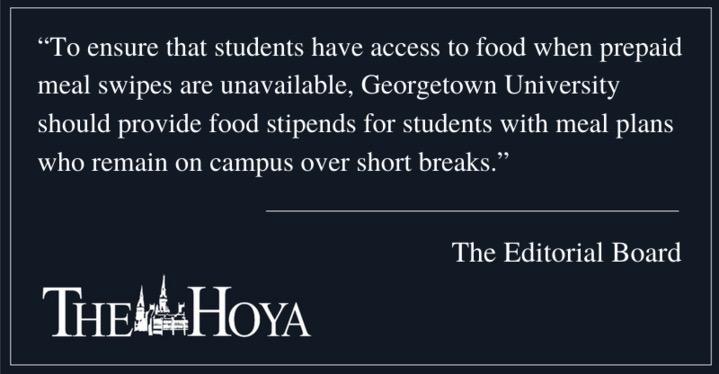When Georgetown University closes campus dining locations over Thanksgiving, spring and Easter breaks, students remaining on campus have to find their own food options. But for some students, Washington, D.C. groceries and restaurants are unaffordable, and thus the closing of meal swipe locations means food is altogether financially inaccessible.
To ensure that students have access to food when prepaid meal swipes are unavailable, Georgetown should provide food stipends for students with meal plans who remain on campus over short breaks. Students could spend the stipends at on- and off-campus stores and restaurants while meal swipe locations are closed.
Food insecurity is a reality for many Georgetown students year-round, according to an April 2018 feature in The Hoya. When all campus dining locations that accept meal swipes are closed during breaks, food becomes even more inaccessible to the students with meal plans who remain on campus.
Georgetown allows students to stay on campus for Thanksgiving, spring and Easter breaks, yet it closes meal swipe locations during these periods. Under current university policy, O’Donovan Hall closes after lunch the day before a break begins and opens for dinner the night before classes resume. For example, over Thanksgiving break, Fresh Food Company was the last meal swipe location to close for the break at 2:30 p.m. on Wednesday, despite break not beginning for students until after all of their Wednesday classes had been completed. The dining hall remained closed until its meal swipe locations opened at 11 a.m. on Sunday, Dec. 1. Consequently, students on campus were left without meal swipe options for the four days of break.
To address the inaccessibility of food over breaks, Georgetown Scholars Program offers a GSP Break Grocery Stipend to students who receive the GSP scholarship, according to the program’s website. But over half of a sample of 351 Georgetown students, many of whom did not receive need-based financial aid, had experienced food insecurity because of cost, according to a survey conducted by the Georgetown University Student Association in 2016. While GSP’s grocery stipend is important, its scope is limited and food is clearly still financially inaccessible for many students outside the program. An initiative combating food insecurity among all students is needed.
To address the inaccessibility of food for all students over the recent Thanksgiving break, the student-led Hoya Hub provided $25 Safeway gift cards to students who requested them, but efforts to alleviate food insecurity on campus should not rely on student-led programs.
Georgetown should build off of the Hoya Hub’s recent Thanksgiving initiative and offer a food stipend to students with meal plans who remain on campus over Thanksgiving, spring and Easter breaks. The university has the infrastructure needed to organize a food stipend program that could be open to all students on meal plans.
Students could request and receive a stipend from the university before the break and use this funding to purchase food for the days during which campus dining locations are closed. If the university deemed it necessary to ensure the funds were spent on food, it could require students to submit receipts after the break.
By providing a food stipend, Georgetown could combat food insecurity without having to open meal swipe locations over breaks. This solution would still allow campus dining employees to have time off while ensuring students on campus have access to food during the several days they cannot use their meal plans.
Furthermore, the university would not be providing stipends to all students, but rather to the small share of students who remain on campus over short breaks and actively request the funds. Georgetown has a responsibility to care for its students by finding the financial resources to combat food insecurity when campus dining locations are closed.
Despite the financial costs, the university must invest in providing basic access to food for all students over short breaks, like Thanksgiving, spring break and Easter, through a food stipend program. Access to food year-round should not be a privilege that only some Georgetown students can afford.









